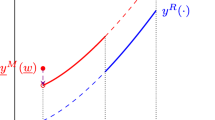Abstract
This paper studies a general class of social choice problems in which agents’ payoff functions (or types) are privately observable random variables, and monetary transfers are not available. We consider cardinal social choice functions which may respond to agents’ preference intensities as well as preference rankings. We show that a social choice function is ex ante Pareto efficient and Bayesian incentive compatible if and only if it is dictatorial. The result holds for arbitrary numbers of agents and alternatives, and under a fairly weak assumption on the joint distribution of types, which allows for arbitrary correlations and asymmetries.
Similar content being viewed by others
Notes
A restricted version of Theorem 1 for the case with two alternatives has appeared as Proposition 3 in the working-paper version of Kikuchi and Koriyama (2023), available at https://arxiv.org/abs/2206.09574.
Part of Mas-Colell et al. (1995, Proposition 16.E.2) says that if \(Y\subset \mathbb {R}^k\) is a convex set and if an element \(y^*\in Y\) is in the Pareto frontier of Y, then there is a vector \(\mu =(\mu _i)_{i=1}^k\) with \(\mu _i\ge 0\) for all \(i=1,\cdots ,k\) and \(\mu \ne 0\) such that \(y^*\) is a solution of the maximization problem \(\max _{y\in Y}\mu \cdot y\).
References
Aziz H, Brandl F, Brandt F, Brill M (2018) On the tradeoff between efficiency and strategyproofness. Games Econ Behav 110:1–18
Azrieli Y, Kim S (2014) Pareto efficiency and weighted majority rules. Int Econ Rev 55:1067–1088
Bhargava M, Majumdar D, Sen A (2015) Incentive-compatible voting rules with positively correlated beliefs. Theor Econ 10:867–885
Börgers T, Postl P (2009) Efficient compromising. J Econ Theory 144:2057–2076
d’Aspremont C, Peleg B (1988) Ordinal Bayesian incentive compatible representations of committees. Soc Choice Welf 5:261–279
Dutta B, Peters H, Sen A (2007) Strategy-proof cardinal decision schemes. Soc Choice Welf 28:163–179
Dutta B, Peters H, Sen A (2008) Strategy-proof cardinal decision schemes. Soc Choice Welf 30:701
Ehlers L, Majumdar D, Mishra D, Sen A (2020) Continuity and incentive compatibility in cardinal mechanisms. J Math Econ 88:31–41
Gibbard A (1973) Manipulation of voting schemes: a general result. Econom J Econom Soc 41:587–601
Gibbard A (1977) Manipulation of schemes that mix voting with chance. Econometrica 45:665–681
Hylland A (1980) Strategy proofness of voting procedures with lotteries as outcomes and infinite sets of strategies, Tech. rep., mimeo
Jackson MO, Sonnenschein HF (2007) Overcoming incentive constraints by linking decisions 1. Econometrica 75:241–257
Kikuchi K, Koriyama Y (2023) The winner-take-all dilemma. Theor Econ 18:917–940
Kim S (2017) Ordinal versus cardinal voting rules: a mechanism design approach. Games Econ Behav 104:350–371
Majumdar D, Roy S (2021) Ordinally Bayesian incentive compatible probabilistic voting rules. Math Soc Sci 114:11–27
Majumdar D, Sen A (2004) Ordinally Bayesian incentive compatible voting rules. Econometrica 72:523–540
Mas-Colell A, Whinston MD, Green JR (1995) Microeconomic theory. Oxford University Press, Oxford
Nandeibam S (1998) An alternative proof of Gibbard’s random dictatorship result. Soc Choice Welf 15:509–519
Nandeibam S (2013) The structure of decision schemes with cardinal preferences. Rev Econ Des 17:205–238
Núñez M, Laslier JF (2014) Preference intensity representation: strategic overstating in large elections. Soc Choice Welf 42:313–340
Satterthwaite MA (1975) Strategy-proofness and Arrow’s conditions: existence and correspondence theorems for voting procedures and social welfare functions. J Econ Theory 10:187–217
Schmitz PW, Tröger T (2012) The (sub-) optimality of the majority rule. Games Econ Behav 74:651–665
Author information
Authors and Affiliations
Corresponding author
Ethics declarations
Conflict of interest
The authors have no competing interests to declare that are relevant to the content of this article.
Additional information
Publisher's Note
Springer Nature remains neutral with regard to jurisdictional claims in published maps and institutional affiliations.
We are thankful to Matías Núñez for the fruitful discussions and useful comments. We are also grateful to two anonymous reviewers and the Associate Editor for their thoughtful and insightful comments. Financial support by Investissements d’Avenir, ANR-11-IDEX-0003/Labex Ecodec/ANR-11-LABX-0047 and PHC Sakura program, project number 45153XK, is gratefully acknowledged.
Rights and permissions
Springer Nature or its licensor (e.g. a society or other partner) holds exclusive rights to this article under a publishing agreement with the author(s) or other rightsholder(s); author self-archiving of the accepted manuscript version of this article is solely governed by the terms of such publishing agreement and applicable law.
About this article
Cite this article
Kikuchi, K., Koriyama, Y. A general impossibility theorem on Pareto efficiency and Bayesian incentive compatibility. Soc Choice Welf (2024). https://doi.org/10.1007/s00355-024-01515-4
Received:
Accepted:
Published:
DOI: https://doi.org/10.1007/s00355-024-01515-4




